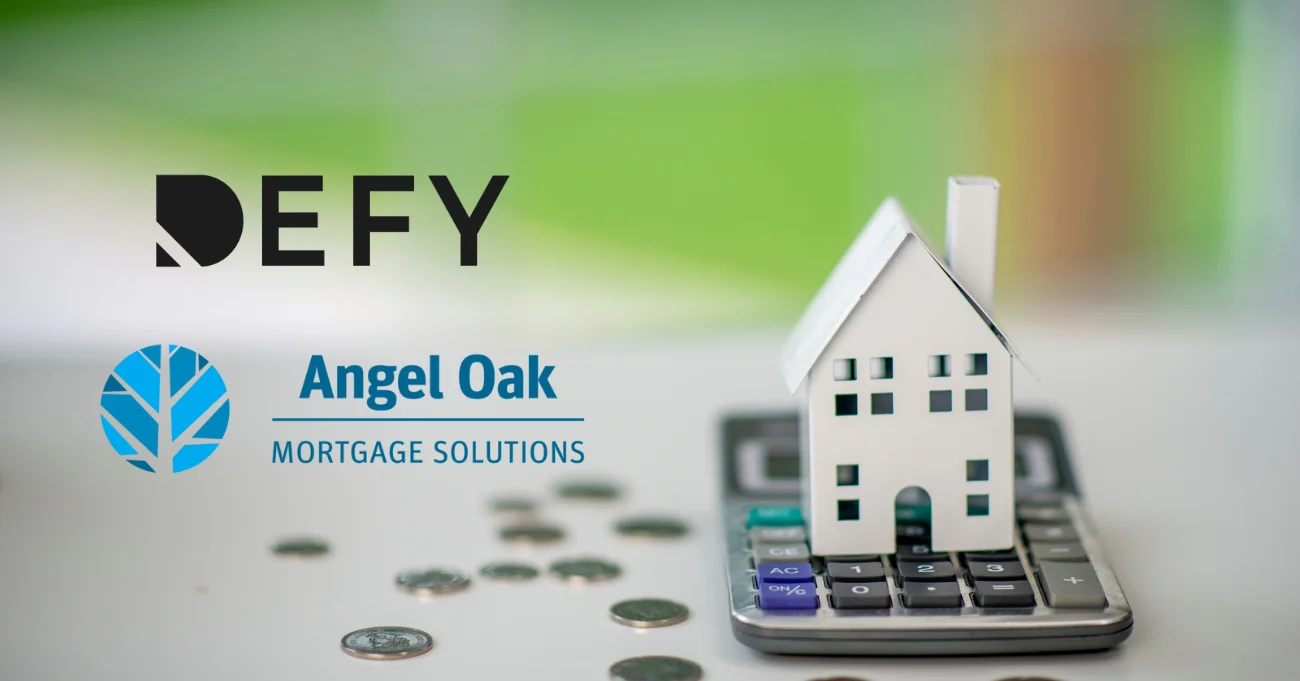Financing your dream home can require more than just a conventional loan. If you’re looking to construct a custom home that often exceeds standard mortgage limits, Jumbo construction loans might be the right fit. They are specifically designed as a tailored solution to fund large-scale construction projects. So how do they work?
At Defy Mortgage, we specialize in creative tailored solutions for complex lending scenarios. With years of experience spanning 75+ non-traditional loan types, including jumbo loans and bank statement loans, we can create a custom loan to suit your needs. Our fast, reliable pre-approvals and dedicated support ensure that your mortgage experience is seamless and stress-free.
In this blog, we’ll explore jumbo construction loans and how they work. We’ll go over the different types of jumbo construction loans and their features, the requirements you need to meet to apply, and the jumbo construction loan process from application to refinancing. We’ll also discuss some alternative financing options if you decide that jumbo construction loans aren’t for you.
Please note that we specialize in other non-qm alternatives such as DSCR loans, Jumbo loans and bank statement loans at Defy Mortgage. This means that we currently do not offer residential ground-up construction loans from primary residences at Defy Mortgage, and we do not provide owner-builder loans for primary residences. Builder approvals are required for select financing options for primary residences.
What Is a Jumbo Construction Loan?
Jumbo construction loans are a specialized financing option designed to fund the construction of custom homes, the price of which exceeds standard mortgage limits. Loans tend to be limited to the conforming loan limit, which is $806,500 for the year 2025 in most areas, as determined in November 2024.
Jumbo construction loans allow for construction projects that cost more than these limits. Unlike standard jumbo loans, which are mostly used for purchasing existing high-value properties, jumbo construction loans provide funds in stages, known as draws, corresponding to construction milestones. This staged disbursement ensures that funds are allocated appropriately throughout the building process.
Types of Jumbo Construction Loans
Jumbo construction loans are categorized based on the borrower’s needs and financial goals. Let’s break down the types of Jumbo Construction loans some lenders offer:
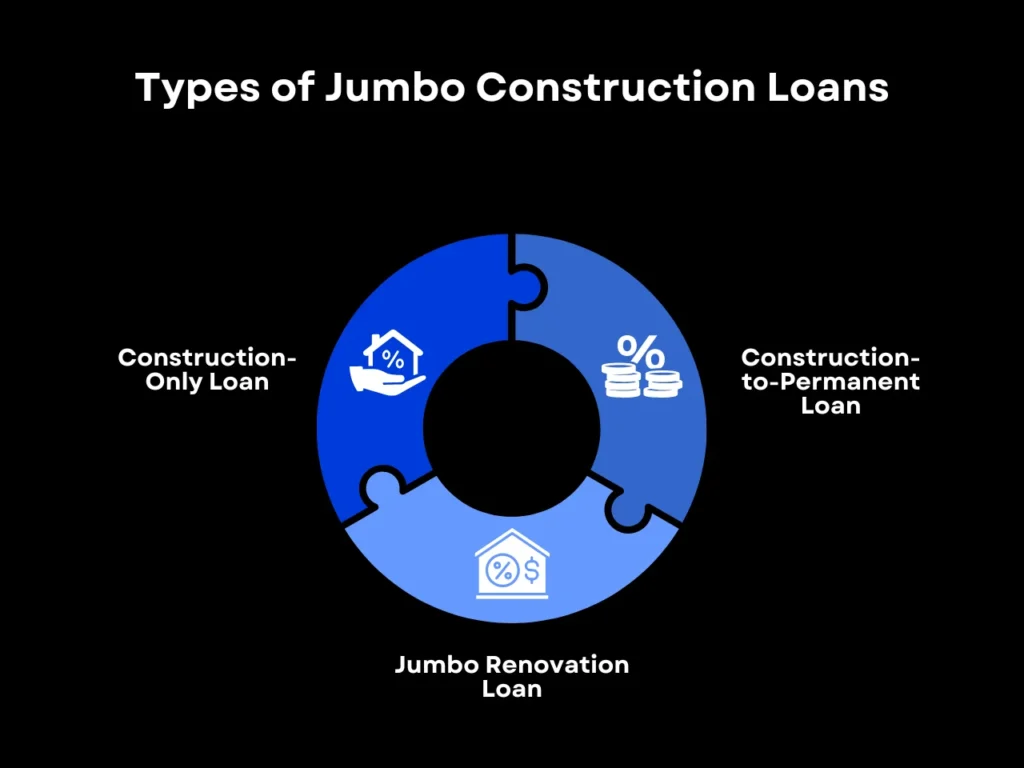
1. Construction-Only Loan
A short-term loan that covers the construction period only. After construction, the borrower must refinance or pay off the loan. This option offers flexibility in that it allows the borrower freedom to choose how they want to proceed with the mortgage, whether it’s to refinance to a long-term loan or pay the construction loan in full.
Key Features:
- Flexibility in Permanent Financing: Borrowers have the opportunity to shop for the best mortgage rates and terms upon completion of construction.
- Lower Initial Loan Amounts: Since the loan only covers construction costs, the initial borrowing amount may be lower. Depending on the amount you will be approved for, this may make a construction-only loan less suited if you want to make a land purchase alongside construction.
2. Construction-to-Permanent Loan
Because construction loans have high initial rates and shorter terms, most people refinance into long-term loans for more manageable payments. A construction-to-permanent loan lets you skip this process: it starts out as a construction loan, covering the building costs, then automatically converts into a permanent mortgage once construction is completed, typically with a fixed interest rate determined at closing.
Key Features:
- Single closing process: By consolidating both loans, borrowers save on closing costs and reduce paperwork.
- Locks in a fixed rate: Since you essentially close on both a construction and a permanent loan, you’re able to lock in a good fixed rate from the start. With a construction-only loan, there’s a risk that rates may suddenly rise by the time you have to refinance into a separate long-term mortgage, leaving you stuck with a higher rate.
- Interest-only payments during construction: Typically, borrowers make interest-only payments during the construction phase, easing financial strain.
3. Jumbo Renovation Loan
A jumbo renovation loan is designed specifically for major home remodels or property expansions that would cost more than the local standard loan limits. This financing option allows borrowers to finance both the purchase of a home and the renovation costs, all in one loan.
Key Features:
- Finance substantial renovations: These loans enable homeowners to fund extensive renovations that may include structural improvements, modernizing outdated systems, or expanding living space.
- Save money by purchasing undervalued properties: Since most jumbo renovation loans also cover the purchase of a property, you can use them to purchase a property that has high potential value but has fallen into disrepair. Renovating such properties to bring their value back up can cost less than simply purchasing a move-in-ready property.
- Streamlined financing: By consolidating purchase and renovation expenses into one loan, homeowners simplify repayment and reduce the complexity associated with managing multiple loans.
- Based on after-renovation value: Similar to fix-and-flip loans, the loan amounts and other terms for a jumbo renovation loan are often determined by the home’s expected value after renovations, potentially increasing borrowing capacity.
What are the Requirements for a Jumbo Construction Loan?
Qualifying for a jumbo construction loan requires meeting stricter criteria than most loan options, mostly because the lender who offers this loan option takes on a higher risk by offering higher loan amounts. Here are the main requirements:
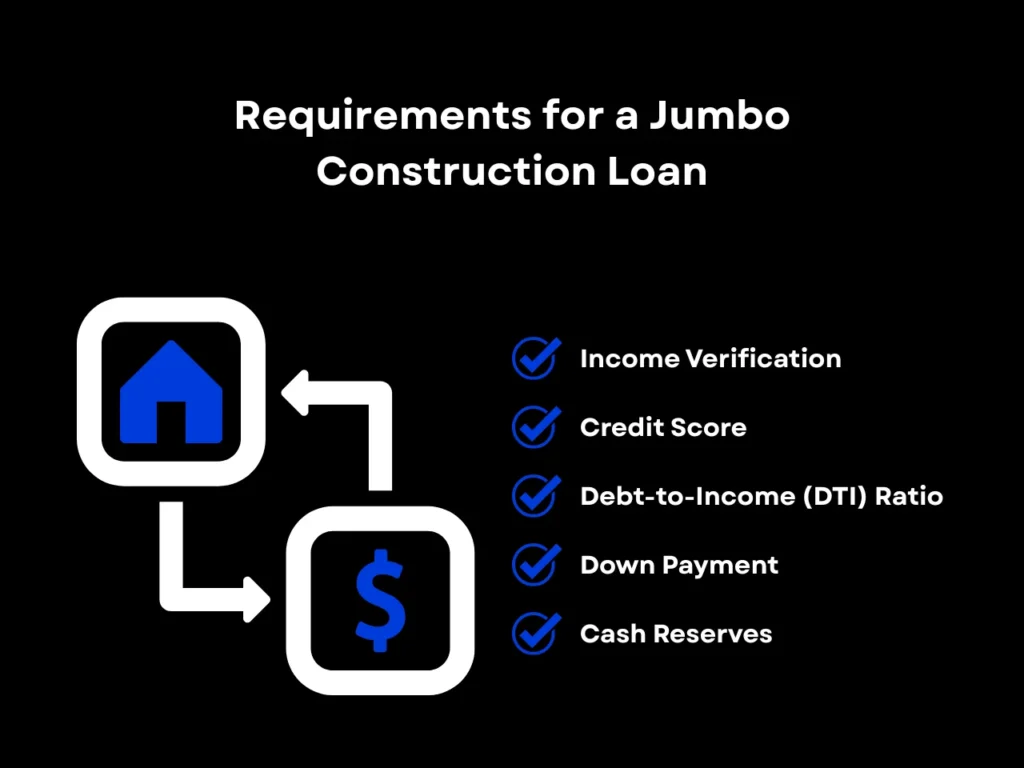
- Income Verification: Tax returns, W-2s, bank statements, and other financial records to verify that you have a consistent income.
- Credit Score: Typically a minimum of 700 is required, though some lenders may accept a minimum of 680 if you have strong financials.
- Debt-to-Income (DTI) Ratio: Lenders usually look for a DTI of under 43%, but keeping your DTI under 35% will give you the best chances of approval and getting the best rates.
- Down Payment: Usually 20-30%, depending on loan structure and lender policies.
- Cash Reserves: Often requires showing 12+ months of mortgage payments in savings. Significant cash reserves can offset shortcomings in other areas, such as credit score or DTI.
Jumbo Construction Loan Process: Step-by-Step
Jumbo construction loans follow a specific process that separates them from other loan types such as DSCR loans, which can be less complex. Here’s a step-by-step breakdown of the application process from preapproval to project completion and conversion of the loan into a long-term mortgage:
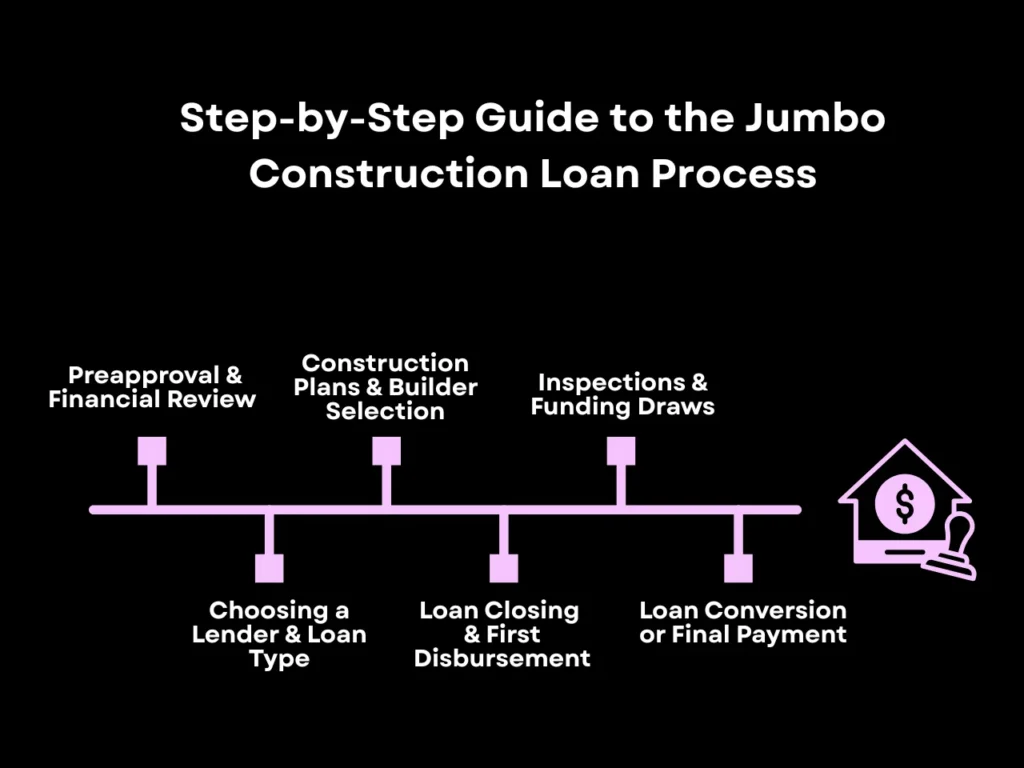
1. Preapproval & Financial Review
Begin by gathering your essential financial documents, including income statements, tax returns, credit reports, and proof of assets. Lenders scrutinize these to assess your financial health and determine loan eligibility.
A strong credit score and low debt-to-income ratio are required. Consider paying down any credit card balances and other loans you may have in order to improve your credit.
2. Choosing a Lender & Loan Type
Private lenders may offer more flexible terms compared to traditional banks with standardized loan structures. Carefully choosing the right lender is often more cost-effective, as lenders experienced in jumbo construction loans are more likely to align rates and draw amounts more closely to project needs. Be sure to ask your lender of choice if they offer jumbo construction loans.
This is also when you should be considering which type of jumbo loan you’d like to take out. Some lenders might only have experience with construction-only loans, or only jumbo loans, while others may offer construction-to-permanent and jumbo renovation loans. The types of loans available to you will inform what options you have–access to a lender who offers jumbo renovation loans gives you the option to purchase and renovate a fixer-upper, while a construction-only loan might only be able to cover the costs of construction.
3. Submitting Construction Plans & Hiring a Builder
Like regular construction loans, lenders may require comprehensive construction plans detailing blueprints, cost estimates, and project timelines. Lenders often have specific criteria or approved lists of builders. The builder’s qualifications can significantly influence loan approval, so doing your due diligence in selecting them is essential.
Please note that we do not offer residential ground-up construction loans from primary residences at Defy Mortgage, and we do not provide owner-builder loans for primary residences. Builder approvals are required for select financing options for primary residences.
4. Closing the Loan & Initial Disbursement
If the lender is satisfied with your credentials, the construction plans, and the builder you selected, they will finalize loan terms and approve your loan. From here, the lender will help you set up an escrow account which will be used to store the loan funds. These funds will be disbursed in stages, known as draws, which will fund each construction milestone. The initial disbursement will cover foundational work, for example, with succeeding disbursements covering the various phases of home construction such as framing and finishing the interior.
5. Construction Inspections & Funding Draws
Throughout construction, lenders will conduct inspections to verify whether the project is progressing according to the submitted plans. Upon successful inspections, they will authorize the next funding draw, releasing additional funds for the next phase. This process ensures accountability and adherence to the projected timeline and budget.
6. Loan Conversion or Final Payment
For construction-to-permanent mortgage loans, the transition to a standard mortgage occurs upon project completion, initiating regular mortgage payments. In the case of construction-only loans, you’ll need to secure permanent financing yourself.
Interest Rates & Loan Terms for Jumbo Construction Loans
Interest rates and loan terms tend to vary depending on the kind of jumbo construction loan. Loan rates are generally lower for shorter terms, but monthly payments are higher since a larger portion of the loan is paid back in a shorter period.
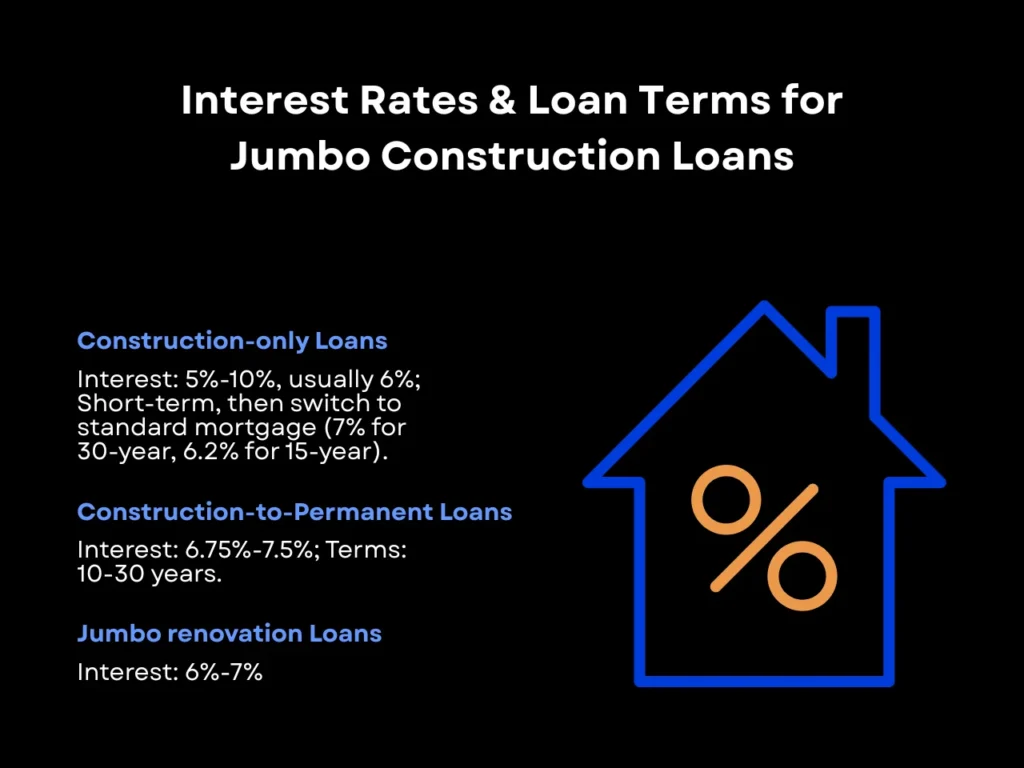
- Construction-only loans: These short-term loans typically have interest rates between 5% and 10%, but most offer rates around 6%. After construction, borrowers usually transition to a standard mortgage, with current 30-year fixed mortgage rates averaging about 7%, and 15-year fixed rates around 6.2%.
- Construction-to-permanent loans: Fixed rates for 10-year terms start at around 6.75%, rising to around 6.875% for 15-year terms. Longer terms from 20 to 30 years start at around 7.375-7.5%.
- Jumbo renovation loans: The average interest rate for jumbo renovation loans is between 6% and 7%.
The interest rates for jumbo construction loans can also vary based on several factors, including the borrower’s creditworthiness, the loan’s purpose, term length, down payment, loan size, and specific property considerations. The construction period for jumbo construction loans often encompasses 12 to 24 months. During this period, borrowers can opt to make interest-only payments.
At Defy, we offer standard jumbo loans, which are mainly intended for purchasing existing properties, and specialize in alternative financing like DSCR loans and other non-QM lending options. Each of our loan types can be fully tailored to fit your needs as well.
Our experienced team of mortgage experts are here to help you. Care to chat? Call us at (615) 622-1032!
Alternative Financing Options for High-End Home Construction
Several financing alternatives to jumbo construction loans are available, each tailored to different financial situations and project requirements. Below are some options to consider:
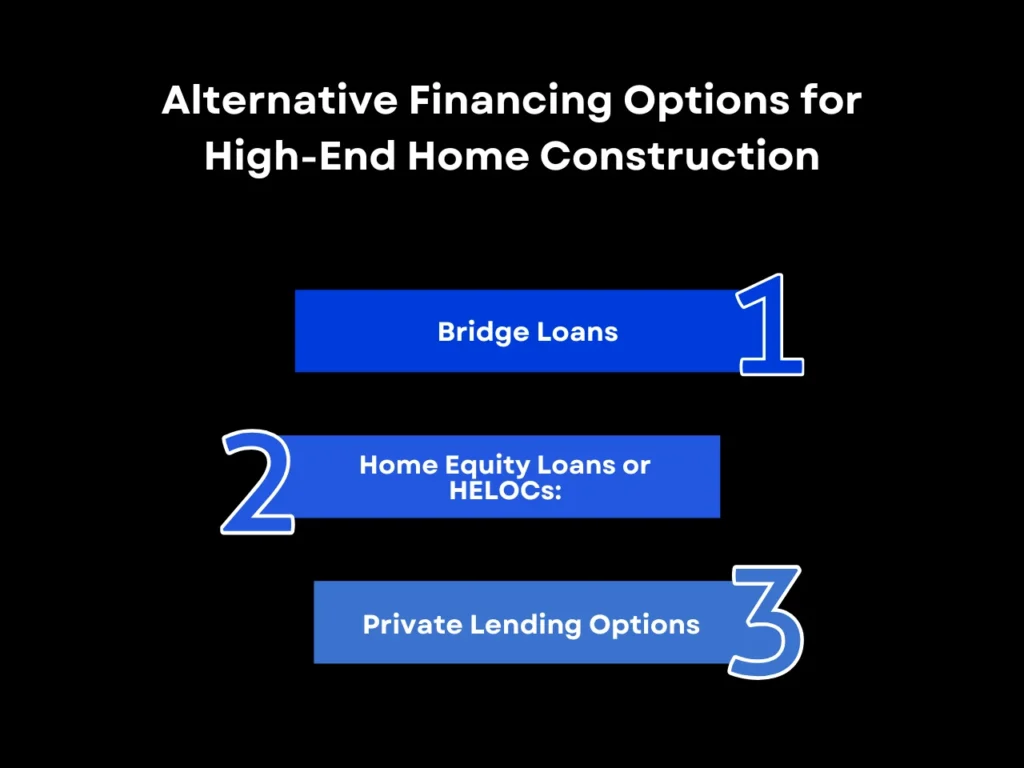
- Bridge Loans: These are short-term loans designed to provide immediate cash flow during transitional periods, such as when you’re selling your current home and constructing a new one. However, they typically come with higher interest rates and require collateral.
- Home Equity Loans or HELOCs: If you have substantial equity in your existing properties, you can use a home equity loan or home equity line of credit (HELOC) to tap into that equity. These loans allow you to borrow against the value of your home, with the funds free to be used for any purpose–in this case, reinvestment into a high-end construction project. HELOCs are a more flexible option, enabling you to draw funds only as needed during construction, minimizing your debt obligation.
- Private Lending Options: Those who may not meet traditional lending criteria or require more flexible terms can seek out private lenders who can provide high-value construction loans. Since they’re not under the jurisdiction of government-sponsored enterprises (GSEs) like Fannie Mae and Freddie Mac, they can offer quicker funding, larger amounts, and more adaptable terms but may come with higher interest rates. They also employ their own ways of vetting borrowers.
Jumbo Construction Loans FAQ
What is the minimum credit score needed for a jumbo construction loan?
Jumbo construction loans typically require a minimum credit score of 700, reflecting the increased risk associated with larger loan amounts. Some lenders may consider applicants with scores as low as 680 if they have substantial income, low debt-to-income ratio (DTI), and significant cash reserves. However, a higher credit score will not only make it more likely to get approved but also help you secure better loan terms and rates.
Can I use a jumbo construction loan for investment properties?
Yes, jumbo construction loans can be utilized for investment properties; however, eligibility depends on individual lender policies and may involve additional requirements. Lenders may also impose stricter qualification criteria for investment properties, including higher down payments, more stringent credit score thresholds, and increased cash reserve requirements.
It’s essential to consult with potential lenders to understand their specific terms and ensure alignment with your investment objectives. If you’d like to purchase an upscale move-in-ready property, it may be more advantageous to take out a jumbo loan. Alternatively, it’s also worth considering a DSCR loan if the property’s potential rental income is high enough.
How do interest rates compare between jumbo and conventional construction loans?
Jumbo construction loans often carry higher interest rates than conventional construction loans due to the increased risk associated with larger loan amounts that exceed conforming loan limits. The difference in interest rates can vary based on market conditions, lender policies, and the borrower’s financial profile, but it’s common for jumbo loans to have rates that are approximately 0.25% to 1% higher than those of conventional loans.
Can I act as my own general contractor when using a jumbo construction loan?
Most lenders prefer borrowers to hire licensed and experienced general contractors for construction projects financed with jumbo loans. Acting as your own general contractor may be permitted by some lenders, but it often requires demonstrating substantial construction experience and financial capacity. Additionally, certain lenders may have policies that restrict or prohibit borrowers from serving as their own builders.
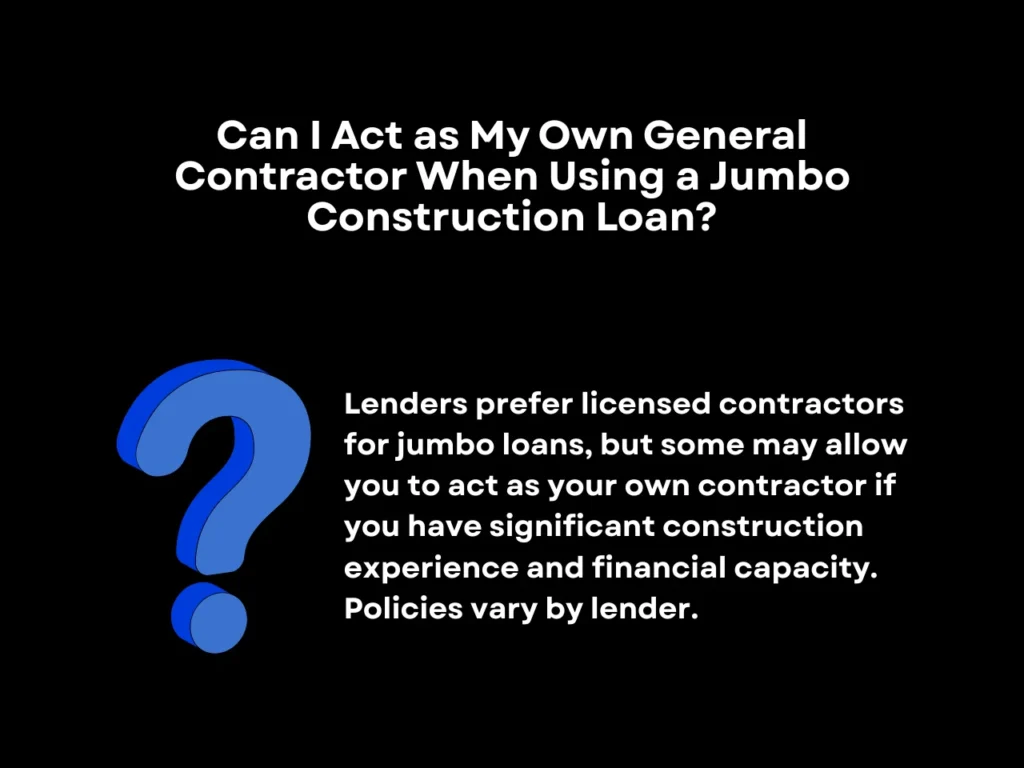
What happens if construction takes longer than expected?
Significant delays may necessitate renegotiations, such as loan term extensions or even refinancing. This can incur additional costs.
Key Takeaway
Jumbo construction loans are vital financing tools for when you would like to build your dream home and require a loan much greater than traditional loan amounts. These loans are specifically designed for high-value projects, offering flexibility in funding custom builds, luxury features, or large-scale properties that exceed conventional loan limits.
If jumbo construction loans sound like the right loan for you, remember to compare lenders who do offer these loan options, assess your financial readiness, and choose a loan structure that aligns with your long-term goals. Lenders may have varying requirements for credit scores, down payments, and debt-to-income ratios.
Looking for other loan options that aren’t jumbo construction loans? Great! Reach out to Defy today and let our mortgage experts help you!

About the Author: Meet Todd Orlando, co-founder and CEO of Defy Mortgage and Defy TPO. With over 20 years of experience in banking and financial services at institutions like First Republic and Morgan Stanley, Todd has dedicated his career to broadening access to lending and revolutionizing the mortgage industry, particularly in the non-QM space.
In 2022, Todd launched Defy Mortgage to provide real estate investors, entrepreneurs, and self-employed individuals with a secure, streamlined, and personalized lending experience tailored to meet their specific needs. He knows firsthand how access to the right mortgage can make or break a project and how today’s borrowers need flexible financial partners and creative lending options designed for their unique needs and lifestyles. Traditional banks are rigid, and their one-size-fits-all approach is outdated. That’s why he created Defy Mortgage — to stay ahead of the curve, set new standards in lending, and deliver personalized, non-traditional solutions for those looking to purchase or refinance.
For the third year running, Todd has been recognized by Inman News for excellence in the mortgage and lending industry, landing on their prestigious Best of Finance list for 2025. He was also honored as a mortgage finance leader in 2023 and 2024 for the same award. His visionary leadership has earned him endorsements from esteemed former colleagues at prestigious institutions across the financial services spectrum.
Beyond his work in finance, Todd is also a co-founder of two software companies in commercial lending and healthcare tech, an active real estate investor, and a husband and father of three. An industry disruptor, Todd is here to redefine what’s possible in mortgage lending.
Mortgage broker itching to elevate client offerings? Check out our TPO business, Defy TPO: https://defytpo.com/


